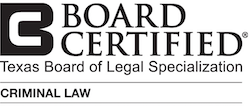Ignition Interlock
DWI Cases: Ignition Interlock as a Requirement
In the State of Texas when an individual is arrested for a DWI, even before a disposition occurs, if certain requirements are met, usually an "Ignition Interlock Device" (IID) or a "Deep-Lung Device" (DLD) are mandated as a condition of bond. It can be a requirement pursuant to Section 17.441 of the Texas Code of Criminal Procedure. The defendant usually has 30 days to have it installed, as stipulated in Section 17.441(a)(2)(c) of the Texas Code of Criminal Procedure. Most of the time it is required if it is a DWI-2nd or more, if there is a motor vehicle accident, and/or if the BAC is (or has with blood results having been returned) of a .15 or higher.
Does Ignition Interlock always a requirement as a bond condition under the circumstances above?
No. According to Section 17.441(a)(2)(b) of the Texas Code of Criminal Procedure, the magistrate may not require the installation of the device "if the magistrate finds that to require the device would not be in the best interest of justice." This, however, usually never applies in real settings from our experience.
What is an Ignition Interlock Device?
In most states, that regulations ensure the installation of interlock devices as a penalty for the offense. It is a device installed in a vehicle to measure the blood alcohol content of the driver, determined by the physical blow from driver’s mouth prior to starting the ignition. If the blood alcohol content is above what is legally acceptable the vehicle will not start. However, taking in consideration that the laws will vary from state to state, it is wise to speak with an experienced Texas DWI Defense attorney to understand the consequences or the options in this defense as applied to those likely reading this.
The ignition interlock device is small in diameter – which can be compared to the size of a cell phone. This is installed in a vehicle to measure the BAC level of the driver. This will prevent the ignition to start if the BAC level of the driver is above the legal amount. It will also monitor breath levels as the driver is driving by breath samples. This will prevent a sober individual as a substitute to blow for the intoxicated driver. The device is designed by fuel-cell sensor technology to detect alcohol content and record data, such as the test results when used. The engine is furnished to stop or start if the device is tampered with.
A possible condition upon release from jail is installing a deep lung device in your vehicle. The purpose of this device is to measure the alcohol concentration in your breath. After blowing into the device, if your concentration is recorded as a 0.030 or above, your vehicle will not start. Until your concentration has fallen below that limit, your vehicle will not be able to be driven. Additionally, you are required to blow into the device every 20 minutes you spend behind the wheel.
Any failures to start your vehicle or an extremely low number of ignition starts will be reported to the courts. You will be held accountable for these infractions at any upcoming hearings. Sometimes no punishment is given, but this is not a guarantee - it is usually up to the discretion of the Judge. Having The Law Offices of Carl Ceder to advocate on your behalf can be essential to avoid any complications with the courts regarding this device.
Overview of Ignition Interlock Laws
Driving While Intoxicated (DWI), Driving Under the Influence (DUI), or any other related intoxication-related criminal offense cases, Texas requires Ignition Interlock in many circumstances (as most states now do). In Texas, as noted above, it can be used as a condition of being out on bond in relation to certain offenses. Ignition Interlock is also a requirement pursuant to Section 521.246 of the Texas Transportation Code, which states, in relevant part, the following:
(a) If the person's license has been suspended after a conviction under Section 49.04, 49.07, or 49.08, Penal Code, the judge, before signing an order, shall determine from the criminal history record information maintained by the department whether the person has any previous conviction under those laws.
(b) As part of the order the judge may restrict the person to the operation of a motor vehicle equipped with an ignition interlock device if the judge determines that the person's license has been suspended following a conviction under Section 49.04, 49.07, or 49.08, Penal Code. As part of the order, the judge shall restrict the person to the operation of a motor vehicle equipped with an ignition interlock device if the judge determines that:
(1) the person has two or more convictions under any combination of Section 49.04, 49.07, or 49.08, Penal Code; or
(2) the person's license has been suspended after a conviction under Section 49.04, Penal Code, for which the person has been punished under Section 49.09, Penal Code.
(c) The person shall obtain the ignition interlock device at the person's own expense unless the court finds that to do so is not in the best interest of justice and enters that finding in the record. If the court determines that the person is unable to pay for the device, the court may impose a reasonable payment schedule for a term not to exceed twice the period of the court's order.
(d) The court shall order the ignition interlock device to remain installed for at least half of the period of supervision.
(e) A person to whom this section applies may operate a motor vehicle without the installation of an approved ignition interlock device if:
(1) the person is required to operate a motor vehicle in the course and scope of the person's employment;
(2) the vehicle is owned by the person's employer;
(3) the employer is not owned or controlled by the person whose driving privilege is restricted;
(4) the employer is notified of the driving privilege restriction; and
(5) proof of that notification is with the vehicle.
(f) A previous conviction may not be used for purposes of restricting a person to the operation of a motor vehicle equipped with an interlock ignition device under this section if:
(1) the previous conviction was a final conviction under Section 49.04, 49.07, or 49.08, Penal Code, and was for an offense committed more than 10 years before the instant offense for which the person was convicted; and
(2) the person has not been convicted of an offense under Section 49.04, 49.07, or 49.08 of that code committed within 10 years before the date on which the instant offense for which the person was convicted.
Potential Problems with Ignition Interlock Devices
The ignition interlock device is supposed to regulate and prevent any driver from driving while under the influence of ANY alcohol. Also, it documents evidence an individual promised to abide by, which is to stay completely sober, and not drink any alcohol. However, potential problems have taken place, such as false-positive results (often mouthwash if used contains alcohol and lead to a possible a false reading). Also, if a person eats a certain type of baked good – containing sugar and yeast, it can result in low alcohol levels. As well, certain malfunctions can result. In fact, since the device uses complex fuel-cell technology, it can malfunction and produce an incorrect reading. It also can cause problems for those who share vehicles. If a person uses this device on their vehicle and he/she provides permission to a spouse/other for use, they will have to abide by the use of the ignition interlock rules as well. There is also a fee for the device to be installed and the offender is required to pay that fee as well as a monthly one. The installation fee is usually around $100. The monthly fee can range from $75 and up. The common installment time is impossible to determine (based on how long the individual is on bond, and what level the offense is, and how long probation is determined to be). It very much depends on the applicable law or the degree of the offense and the terms of the sentence.
Contact Us now
The laws concerning the use of ignition interlock device have spread across more states than before. It is best to consult with a Texas DWI Defense Attorney before having one installed. Do you have concerns or questions? Contact an experienced Texas DUI/DWI attorney now. You can contact The Law Offices of Carl David Ceder at anytime for assistance at 214.702.CARL(2275) or at 469.2000.DWI(394). You can also e-mail Carl directly, at Carl@CederLaw.com; or to the office for general inquiries at Info@DFWDefenders.com. Phones should be answered 24 hours a day/7 days a week for immediate and personal assistance. E-mail messages will be responded to with 24-48 hours, depending on whether Carl is in trial.




















